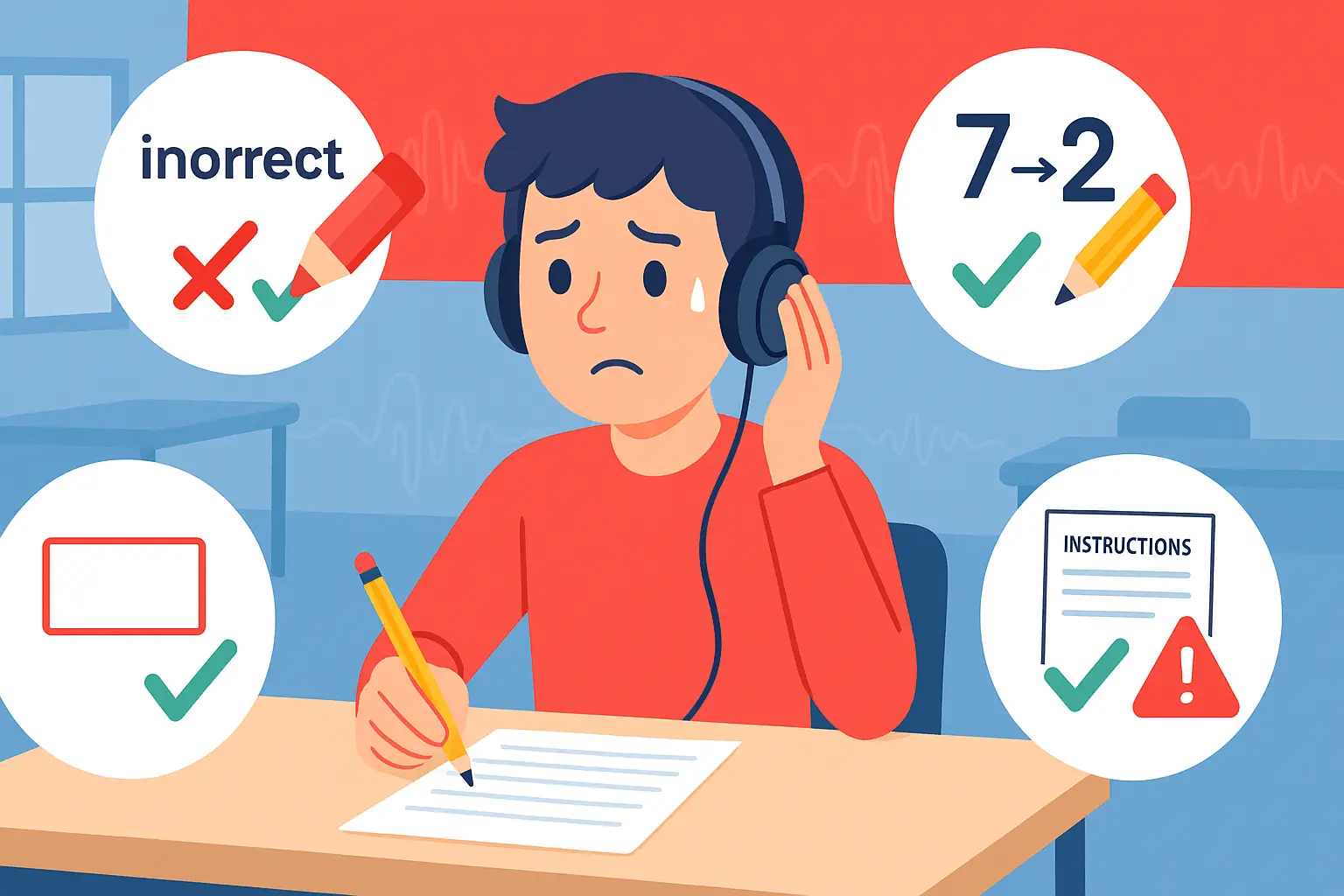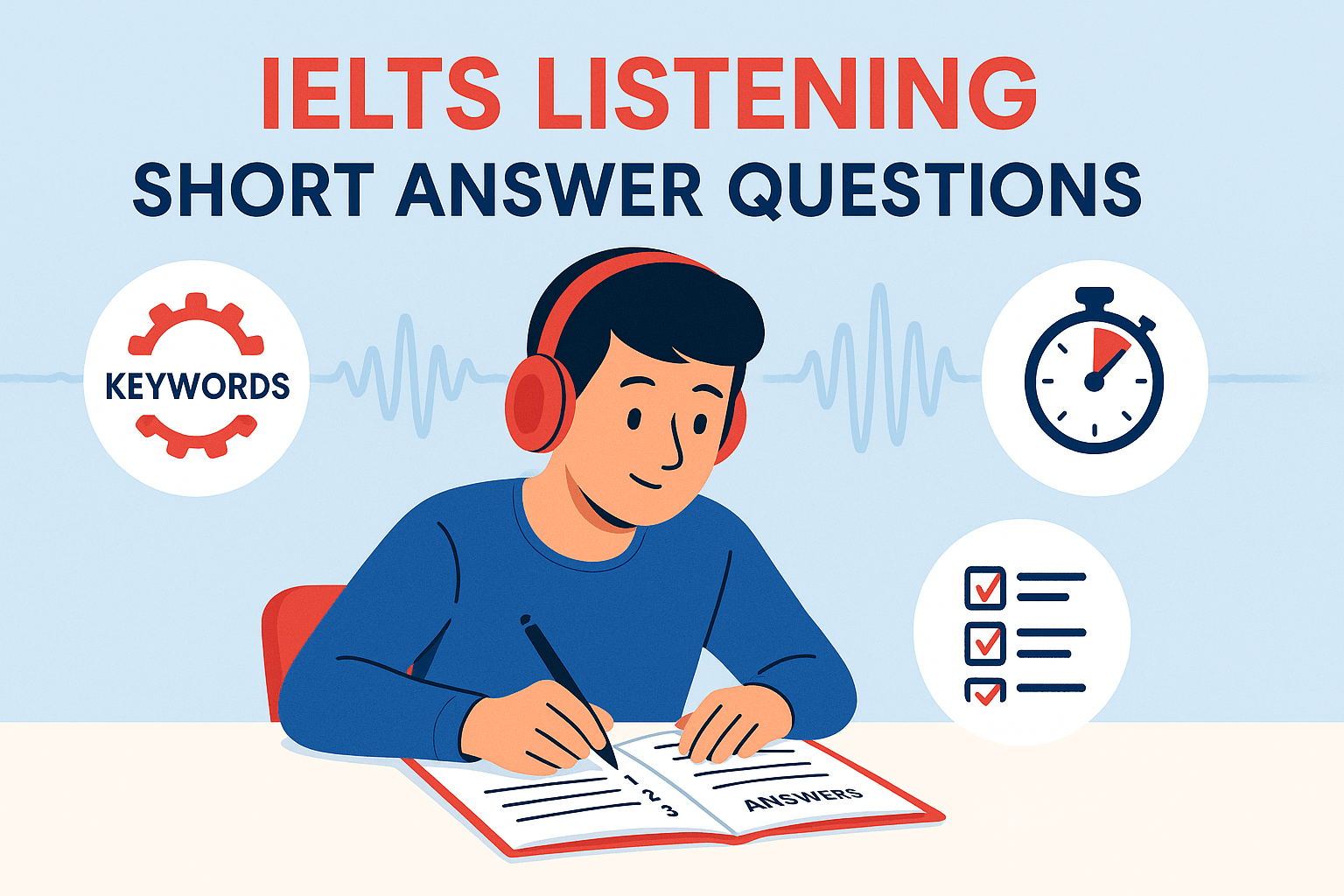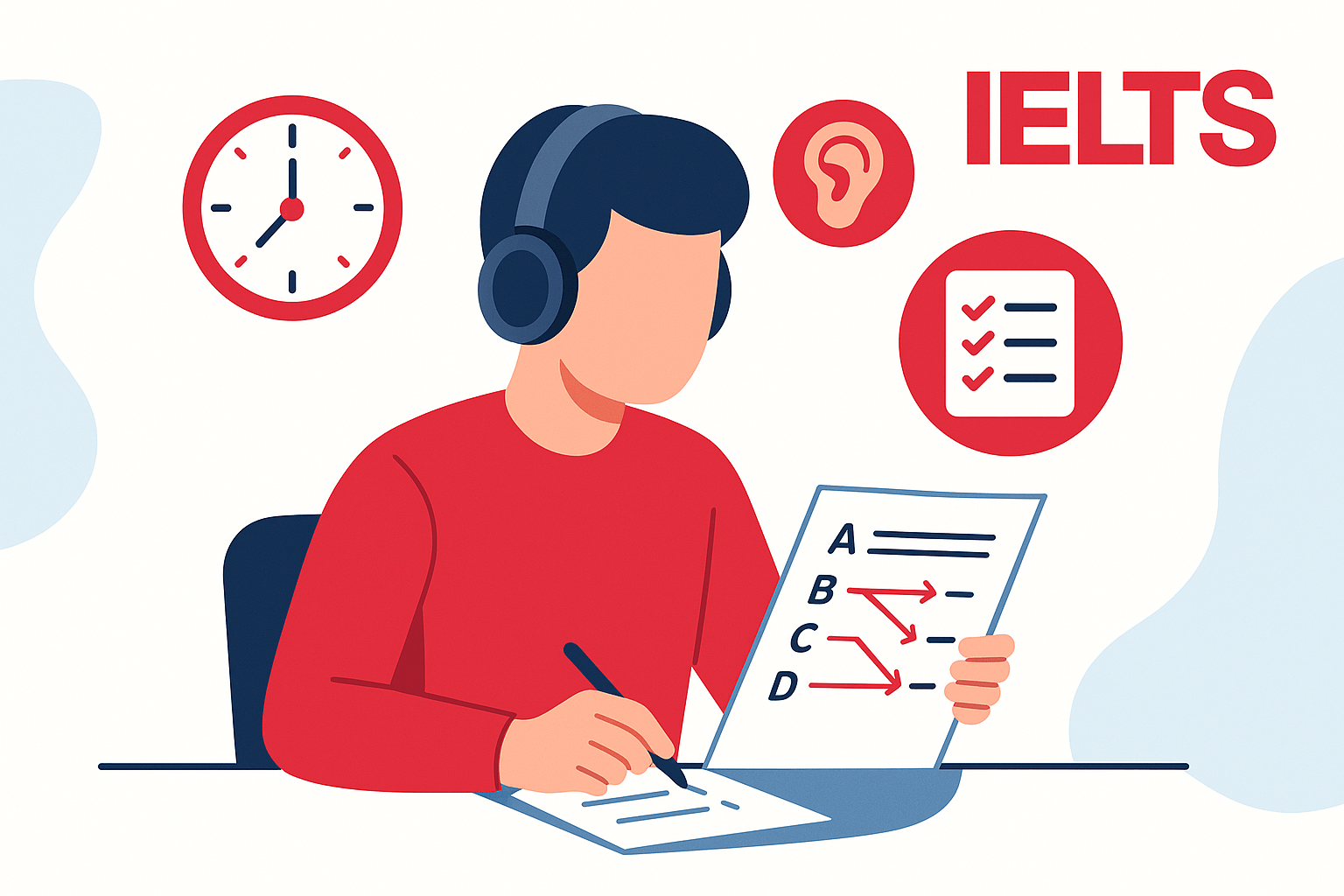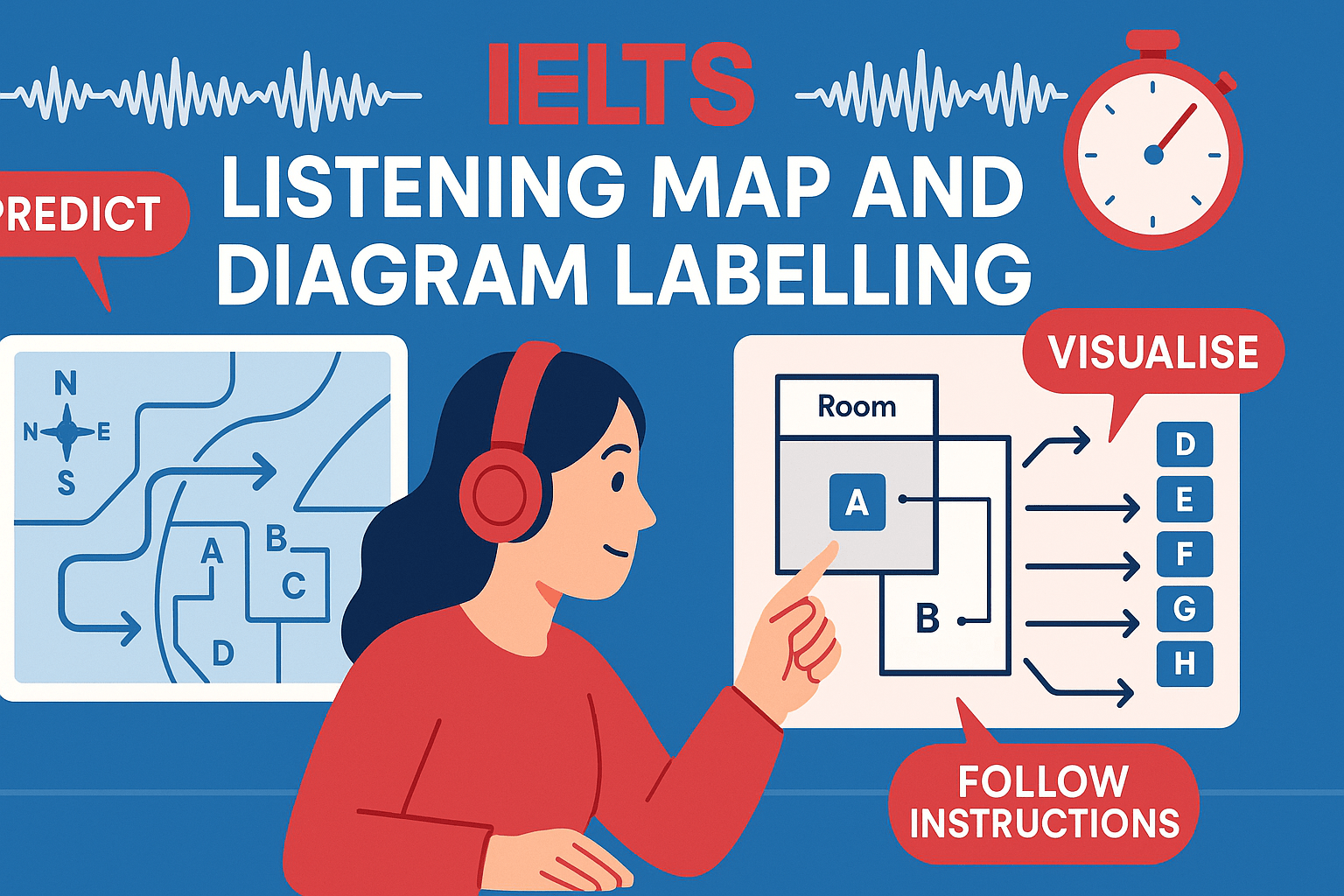- Spelling Errors
- Not Reading the Instructions Carefully
- Incorrect Number Formats
- Misplacing Answers on the Answer Sheet
- Leaving Answers Blank
- Not Using Predictive Listening Skills
- Poor Synonym Awareness
- Writing Too Soon or Too Late
- Losing Focus Mid-Test
- Incorrect Use of Capital Letters
- Final Thoughts
- FAQs: IELTS Listening Common Mistakes
- Ready to Turn Mistakes into Marks?
As an international IELTS teacher working with students from over 20 countries, I’ve seen just how common — and avoidable — mistakes can cost valuable marks in the IELTS Listening test. In this post, I’ll walk you through the top 10 IELTS Listening common mistakes my students make and, more importantly, how to fix them. These fixes have helped many learners jump from Band 6 to Band 7.5+, and I’m confident they’ll help you too.
Whether you’re preparing for IELTS with the British Council, IDP, or directly through ielts.org, the listening section tests much more than your ears — it tests your accuracy, focus, and strategy. Let’s dive in.
Spelling Errors
This is by far the most frequent IELTS Listening common mistake I see. You might get the correct answer by sound, but if it’s spelled wrong, it’s marked incorrect. For example, one of my students in Egypt consistently wrote “adress” instead of “address”.
Fix: Create a personal spelling list as you study. Practice high-frequency IELTS vocabulary like “accommodation,” “environment,” and “February.” I also recommend reviewing your IELTS Listening band descriptors and errors to see how spelling affects your band score.
Not Reading the Instructions Carefully
This simple mistake can cost you multiple points. If the instruction says “No more than two words” and you write three, it’s wrong — even if the information is correct.
Fix: Train yourself to highlight or underline keywords in the instructions during the 30-second preparation time. I often make students do a “reading the instructions” drill before every mock test to build this habit.
Incorrect Number Formats
Many students lose marks because they mishear or miswrite phone numbers, postcodes, or reference numbers. One learner wrote “F14RZ” instead of “S14RZ” — a small but costly slip.
Fix: Practice with audio that includes alphanumeric information. Repeat it out loud, pause, and transcribe. Sites like IELTS.org offer official practice material with these formats.
Misplacing Answers on the Answer Sheet
This happens often when students don’t transfer answers carefully from the question booklet to the answer sheet. I’ve seen students accidentally start from question 2 and shift all their answers by one line.
Fix: Always double-check that the answer you’re writing matches the right question number. In class, I simulate this with printed answer sheets and timed drills.
Leaving Answers Blank
Some learners feel unsure and skip a question, thinking it’s better to leave it empty. That’s a missed opportunity.
Fix: Always write something. There’s no penalty for wrong answers. I train my students to make educated guesses based on logic or context.
Not Using Predictive Listening Skills
Before the audio starts, you get time to read the questions. Many students waste this golden opportunity.
Fix: Learn to predict word types — noun, verb, number — and possible synonyms. This is one of the core strategies I explain in my IELTS Listening Band 7–9 Guide. The more you predict, the more you focus.
Poor Synonym Awareness
You won’t always hear the exact words in the question. One student expected “cheap” but the speaker said “affordable” — and she missed the answer.
Fix: Build synonym lists for common IELTS topics like travel, education, and health. Practice paraphrasing daily.
Writing Too Soon or Too Late
Students often panic and either write too early (missing the correct answer) or too late (missing the next question).
Fix: Listen for signpost phrases like “Let’s move on to…” or “Another point to consider…” These help you stay aligned with the recording. I use timed audio exercises to train this balance in every lesson.
Losing Focus Mid-Test
IELTS Listening lasts around 30 minutes — that’s a long time to stay focused. I’ve seen top-performing students drop scores just because they zoned out during Section 3 or 4.
Fix: Build mental stamina with 30-minute uninterrupted listening sessions. Also, train your focus in noisy environments — it mirrors real-life test conditions.
Incorrect Use of Capital Letters
Some students ask: “Should I use capital letters?” You can, but be consistent. I once had a student who used capitals for some answers and lowercase for others — this caused confusion and loss of marks.
Fix: Choose one format and stick to it. Personally, I recommend using ALL CAPS on the answer sheet to avoid errors with proper nouns or sentence beginnings.
Final Thoughts
These IELTS Listening common mistakes can easily be avoided with the right strategy, practice, and awareness. I’ve seen hundreds of students improve dramatically by simply fixing these small habits. If you’re serious about getting Band 7, 8, or even 9 — take these seriously. Go beyond just “listening” — engage with the skills, patterns, and structure of the test.
Need more help? Explore the official IELTS site or book your test through IDP or British Council. And of course, check out my full IELTS Listening Band 7–9 Guide for strategies, question types, and band scoring insights.
FAQs: IELTS Listening Common Mistakes
Q1: Will I lose marks for spelling in IELTS Listening?
Yes. Spelling matters. Even a minor spelling mistake will result in a zero for that answer.
Q2: Can I write in all capital letters on the answer sheet?
Yes, you can. In fact, using all capital letters is recommended to avoid confusion, especially for proper nouns.
Q3: What if I miss an answer during the audio?
Don’t panic. Focus on the next question. You can guess the missed one later — there’s no penalty for wrong answers.
Q4: How can I improve my focus for 30 minutes of listening?
Practice full-length IELTS Listening tests regularly. Minimise distractions and simulate real test conditions during practice.
Q5: How important is it to read the instructions?
Extremely important. Misreading instructions like “No more than two words” can cost you marks, even if the answer is correct in meaning.
Ready to Turn Mistakes into Marks?
Remember, even the most advanced IELTS candidates make avoidable errors — the difference is they learn from them. The IELTS Listening test doesn’t just assess how well you understand English; it measures how well you apply strategies under pressure. By fixing these common mistakes, you’re not just avoiding traps — you’re actively building the skills that lead to Band 7, 8, or even 9. Keep practising smart, stay consistent, and don’t be afraid to make mistakes — as long as you fix them. Your next breakthrough might be just one small correction away.






One Response